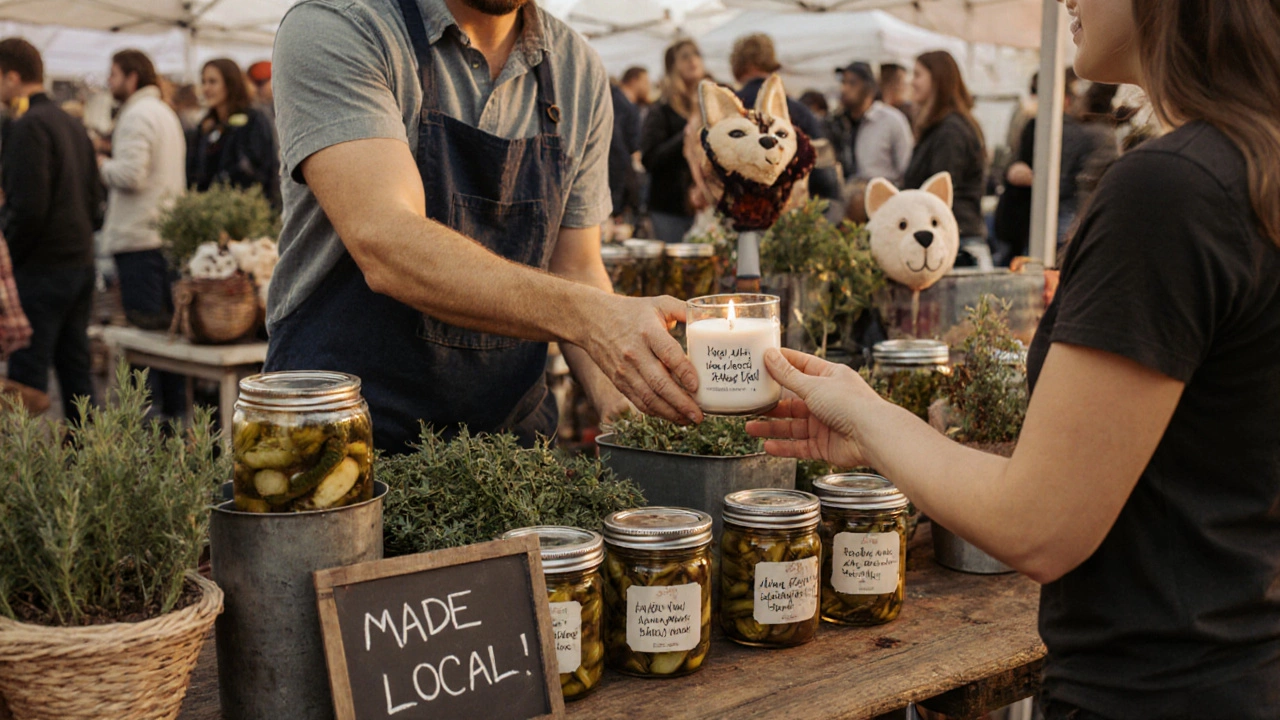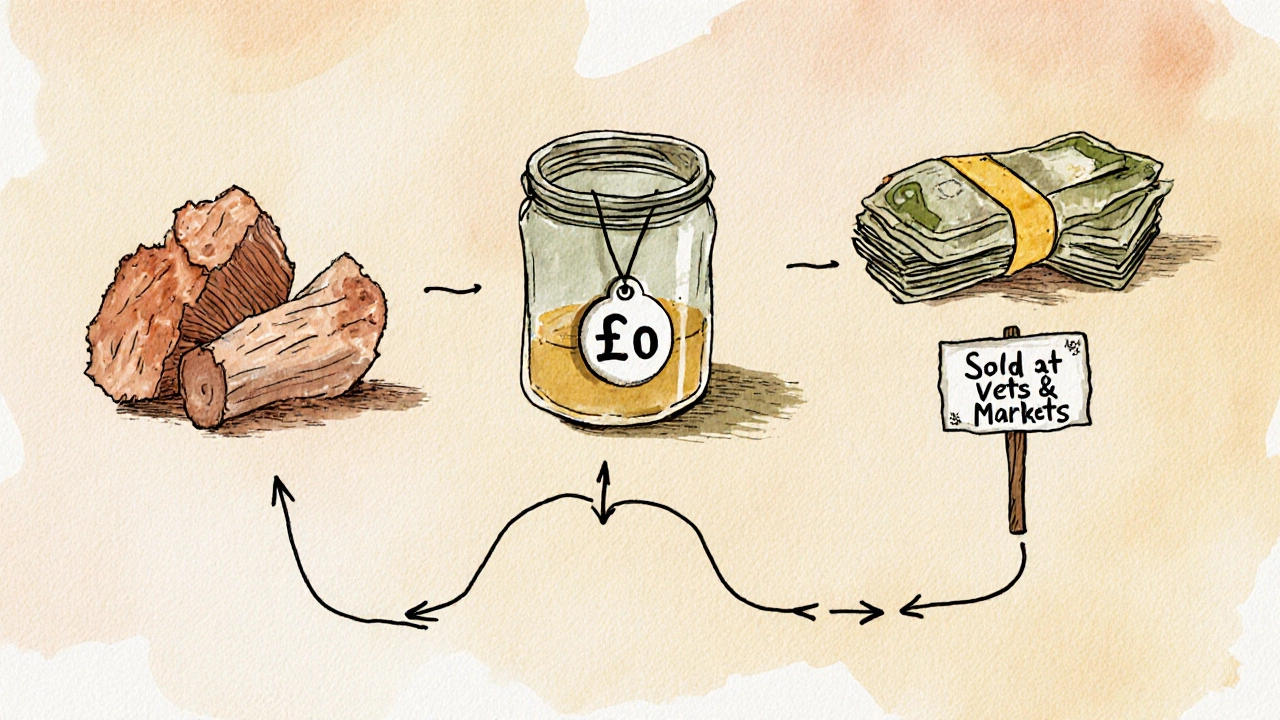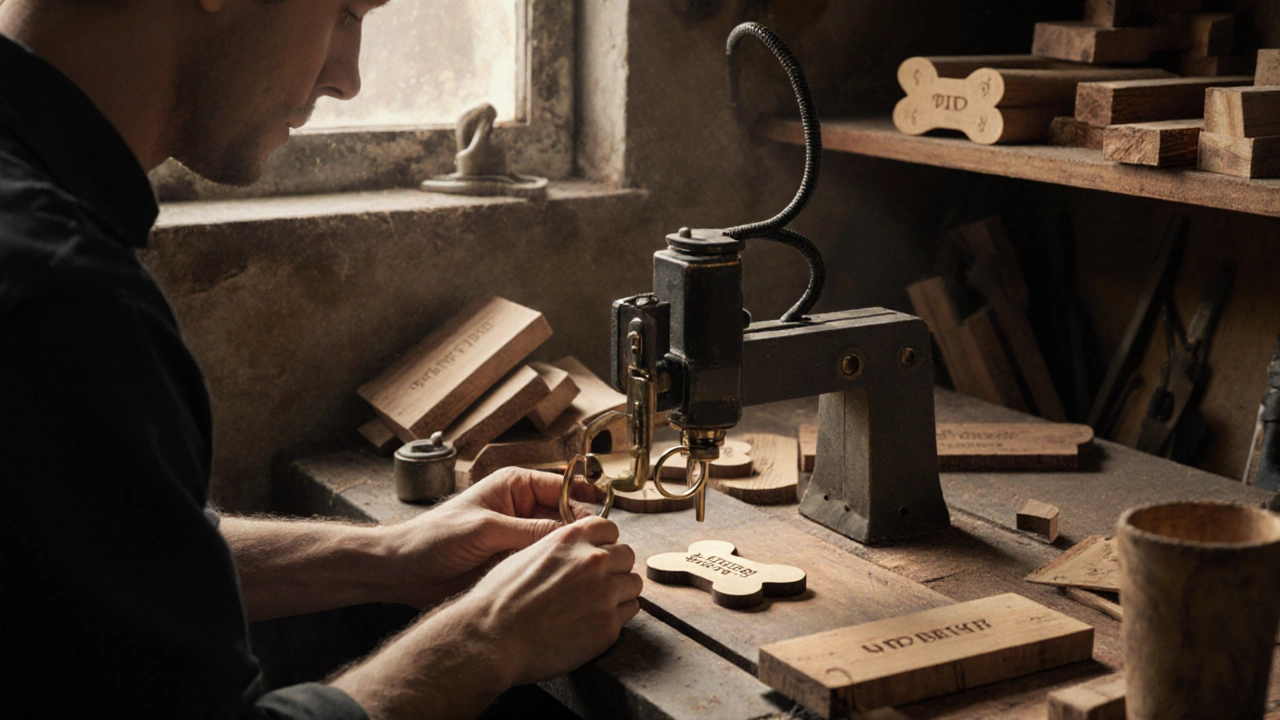Manufacturing Business Profit Calculator
Calculate Your Potential Profit
How It Works
Based on the article's fastest manufacturing business models, this calculator shows:
- Break-even point in days
- Monthly profit potential
- How your numbers compare to real examples
Real-World Example
"The £1,200 in 21 days story: A woman in Solihull made custom engraved wooden dog tags. She spent £350 on tools and materials, produced 120 items in a weekend, and sold them all for £10 each."
21 days £1,200 profit
Your Business Potential
Break-even Days
-
Daily Profit
-
Monthly Profit
-
Compare to article examples: -
Want to start a business that actually makes money in weeks, not years? Most people think you need big money, a fancy office, or a tech degree. That’s not true. The fastest businesses to start in 2025 aren’t apps or dropshipping stores-they’re simple, hands-on manufacturing ideas that use what you already have: tools, space, and a willingness to get dirty.
Why manufacturing beats online hustle culture
You’ve seen the TikTok videos: "Make $10,000 selling phone cases!" But here’s the truth-those businesses are crowded, saturated, and rely on paid ads that eat your profit. Real speed comes from making something physical, selling it locally, and cutting out middlemen.Take a guy in Birmingham who started making custom wooden cutting boards. He bought a $200 band saw from eBay, used scrap wood from a local cabinetmaker, and sold them at weekend markets. In 11 days, he made his first £500. No website. No ads. Just product, price, and people.
Manufacturing businesses like this don’t need inventory warehouses. They don’t need complex logistics. They need one thing: a repeatable process that turns raw material into something people want to buy right now.
5 fastest manufacturing businesses to start in 2025
Here are five real, low-barrier manufacturing ideas that can turn a profit in under 30 days. All require under £1,000 to start, most can be done in a garage or backyard, and all have local demand.
- Custom engraved keychains and pet tags - Buy a £150 laser engraver (used ones go for less), source blank brass or acrylic from Alibaba, and sell on Etsy or at pet stores. People buy these as gifts. Profit per item: £8-£15. You can make 20-30 a day.
- Hand-poured soy candles in reusable jars - Soy wax costs £12 per kg. Jars from local thrift stores are free or £0.50 each. Essential oils? £5 for enough for 50 candles. Sell them for £12-£18. Local farmers markets and gift shops buy them fast.
- Small-batch pickled vegetables - Buy cucumbers, beets, and onions in bulk from wholesale markets. Use sterilized glass jars. Add vinegar, salt, garlic, and spices. Label them with your name and sell at farm stands or local cafes. No license needed if you sell under £1,000/month in most UK areas. Profit margin: 70%.
- Custom metal planters from recycled steel - Scavenge old steel drums or offcuts from metal fabricators. Cut, weld, sand, and paint them. Sell as urban garden planters. A 12-inch planter costs £8 to make. Sell for £45. Local garden centers will take them on consignment.
- Printed fabric face masks (for pets or people) - Buy fabric remnants from textile wholesalers for £2-£5 per yard. Use a basic sewing machine. Make 50 masks in a weekend. Sell to vet clinics, dog walkers, or local boutiques. No medical claims needed. People buy them because they’re cute, not because they’re "medical-grade."
What makes these fast? The 3 rules
These businesses work because they follow three rules most beginners ignore.
- Use waste or cheap materials - Don’t buy new. Find scrap wood, old jars, broken metal, fabric offcuts. One metalworker in Sheffield started making garden signs from discarded steel pipes. He got them free from a demolition site. Now he sells them for £30 each.
- Sell locally first - Don’t wait for Amazon or Etsy to work. Walk into coffee shops, pet stores, and farmers markets. Ask if they’ll take 5 items on consignment. Most say yes. You get instant feedback and cash flow.
- Start with one product - Don’t make 10 types of candles. Make one scent. One shape. One size. Master it. Then scale. The person who made 500 custom keychains in a month didn’t start with a catalog. He started with one design: a dog bone with the owner’s name.

Tools you actually need (and what you don’t)
You don’t need a factory. You need a few tools you can rent or buy secondhand.
- Hand drill or impact driver (£40)
- Basic sewing machine (£100 on eBay)
- Laser engraver (used, £120-£180)
- Heat gun or hot glue gun (£15)
- Measuring tape, clamps, sandpaper
Forget CNC machines, 3D printers, or industrial ovens. You’re not building a Tesla. You’re making a keychain that someone will hang on their keys tomorrow.
Legal stuff you can ignore (for now)
In the UK, if you’re making under £1,000 a month in sales from home, you don’t need to register as a business. You just need to declare it on your tax return at the end of the year.
Food items? If you’re selling pickles or jams from home, you don’t need a food hygiene certificate if you’re selling directly to customers at markets or door-to-door. But keep your workspace clean. No one will report you for that.
Label everything. Even if it’s just a sticker with your name and "Made in Birmingham." It builds trust.
Real example: The £1,200 in 21 days story
A woman in Solihull started making custom engraved wooden dog tags. She spent £350 on a used laser cutter. She bought untreated beech wood from a local timber yard for £12 per sheet. Each tag took 3 minutes to cut and 2 minutes to sand. She made 120 in a weekend.
She took them to three local vets. One said yes. She sold 60 in two days. She posted a photo on Facebook. Someone shared it. A dog walking service ordered 40. Then a pet boutique asked for 30 more.
By day 21, she’d made £1,200. She didn’t have a website. She didn’t run ads. She just made something simple, showed up, and asked people to buy it.

What doesn’t work (and why)
Don’t try to make furniture. It takes too long. Don’t try to make plastic parts. You need molds and injection machines. Don’t try to sell to supermarkets. They want 5,000 units, not 50.
The fastest businesses are small, personal, and local. They’re not scalable at first. They’re profitable at first.
How to start tomorrow
Here’s your 24-hour plan:
- Walk around your house or garage. What’s lying around you could turn into something? Old jars? Scrap wood? Fabric scraps?
- Go to Facebook Marketplace or Gumtree. Search for "free wood," "free metal," "fabric scraps." Collect 3 items.
- Choose one product idea from the list above. Make one sample.
- Take a photo. Post it on your local Facebook group. Say: "Made this from scrap wood. £10. First one buys it."
- If no one buys it, tweak it. Change the color. Add a name. Try again.
Speed isn’t about money. It’s about action. The fastest business to start is the one you begin before you feel ready.
Can I start a manufacturing business with no experience?
Yes. Most of the fastest manufacturing businesses require no formal training. You learn by doing. Start with one product. Watch YouTube tutorials on basic wood sanding, candle pouring, or sewing. Practice on scrap materials. Your first 10 items won’t be perfect-and that’s fine. People buy from people, not perfection.
Do I need a business bank account?
Not at first. You can use your personal account and keep a simple notebook of income and expenses. Once you’re making over £1,000 a month, open a separate account. It makes tax time easier. But don’t wait for permission to start.
How long until I make my first pound?
If you start today, you can make your first sale in 48 hours. One man in Wolverhampton made 12 engraved bottle openers from scrap metal, posted them on a local buy-and-sell group, and sold them all for £5 each by lunchtime the next day. Speed comes from action, not planning.
Are these businesses profitable long-term?
They can be. Many of these small manufacturing businesses grow into full-time incomes. The key is to keep the margins high and the overhead low. Once you’ve proven demand, you can add new products, hire help, or wholesale to local shops. But start small. Profitability comes from repetition, not scale.
What if I live in a small town or don’t have a car?
You don’t need a car. Sell online locally. Use Facebook Marketplace, Nextdoor, or local WhatsApp groups. Deliver by bike or bus if needed. Many buyers prefer local pickup-it saves them money. You can even partner with a local café to display your items. They get foot traffic. You get sales.
Next steps: Pick one. Start today.
The fastest business to start isn’t the one with the most funding. It’s the one you begin before you’re ready. Pick one idea from the list. Gather three materials. Make one thing. Sell it to someone you know. That’s it. The rest follows.
Don’t wait for perfect tools. Don’t wait for a website. Don’t wait for approval. Start with what you have. Make something real. Someone will pay for it.






